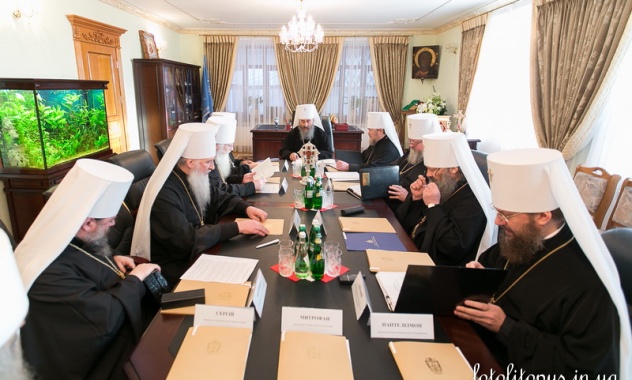Meeting of the Holy Synod of the Ukrainian Orthodox Church
 On December 23, 2014, the Synod of the Ukrainian Orthodox Church met for its last session in 2014, at the Synodal Hall of the Kiev Laura of the Dormition. The session was chaired by His Beatitude Onufry, Metropolitan of Kiev and All Ukraine.
On December 23, 2014, the Synod of the Ukrainian Orthodox Church met for its last session in 2014, at the Synodal Hall of the Kiev Laura of the Dormition. The session was chaired by His Beatitude Onufry, Metropolitan of Kiev and All Ukraine.
The Synod adopted an appeal to President Petro Poroshenko concerning the critical situation in the Ukrainian society. The appeal cites glaring facts of the damage inflicted on churches in the armed conflict zone in south-east Ukraine: 9 churches are fully destroyed, 77 are damaged; the residence of the Metropolitan of Donetsk at the Peski village near Donetsk is plundered. The Holy Synod appealed to the Ukrainian President to ensure due and impartial investigation of these facts.
The message also informs the Ukrainian President about the forceful capture of 14 churches perpetrated by the schismatics in the Kiev, Lvov, Ternopol, Volhyn and Rovno Regions. ‘The historical experience shows’, the Synod states, ‘that conflicts on religious grounds prove to be the gravest and bloodiest. They deeply affect the lives of countries and peoples. It may take more than one decade to overcome their consequences. Therefore, today we should exert as much effort as we can to preserve inter-confessional and interreligious peace in Ukraine’.
The Holy Synod draws Mr. Poroshenko’s attention to the scale of the humanitarian programs that the Ukrainian Orthodox Church has carried out in the armed conflict zone in the southeast. In 2014, its dioceses sent over 850 tons of humanitarian aid and distributed over 7000 tons to civilians and forced settlers. The clergy and faithful have organized the evacuation and accommodation of refugees, raised funds, established diocesan humanitarian aid centers and a hotline ‘Nadezhda’ (Hope) to give spiritual support to people.
In connection with the rise of municipal service prices, the Synod also made an appeal to President Poroshenko and Prime Minister Yatsenyuk to fix special prices for gas for religious organizations.
The UOC synodal departments presented traditional annual reports about the work they carried out in 2014. Special attention was given to the work of the social-humanitarian department. It was charged with developing and implementing a program for designated aid to ‘people in the Donetsk and Lugansk Regions and forced settlers’, and all the faithful were called to take part in the program.
The Synod adopted a program and membership of the organizing committee for celebrations to mark the 400th anniversary of the Kiev theological schools to take place in 2015.
The Synod also adopted a Provision for the Metropolitan’s Council on Culture.
The Synod also made a number of legal, staffing and disciplinary decisions concerning the internal life and order of the synodal departments, dioceses, monasteries and educational institutions of the Ukrainian Orthodox Church.
Source: OCP

